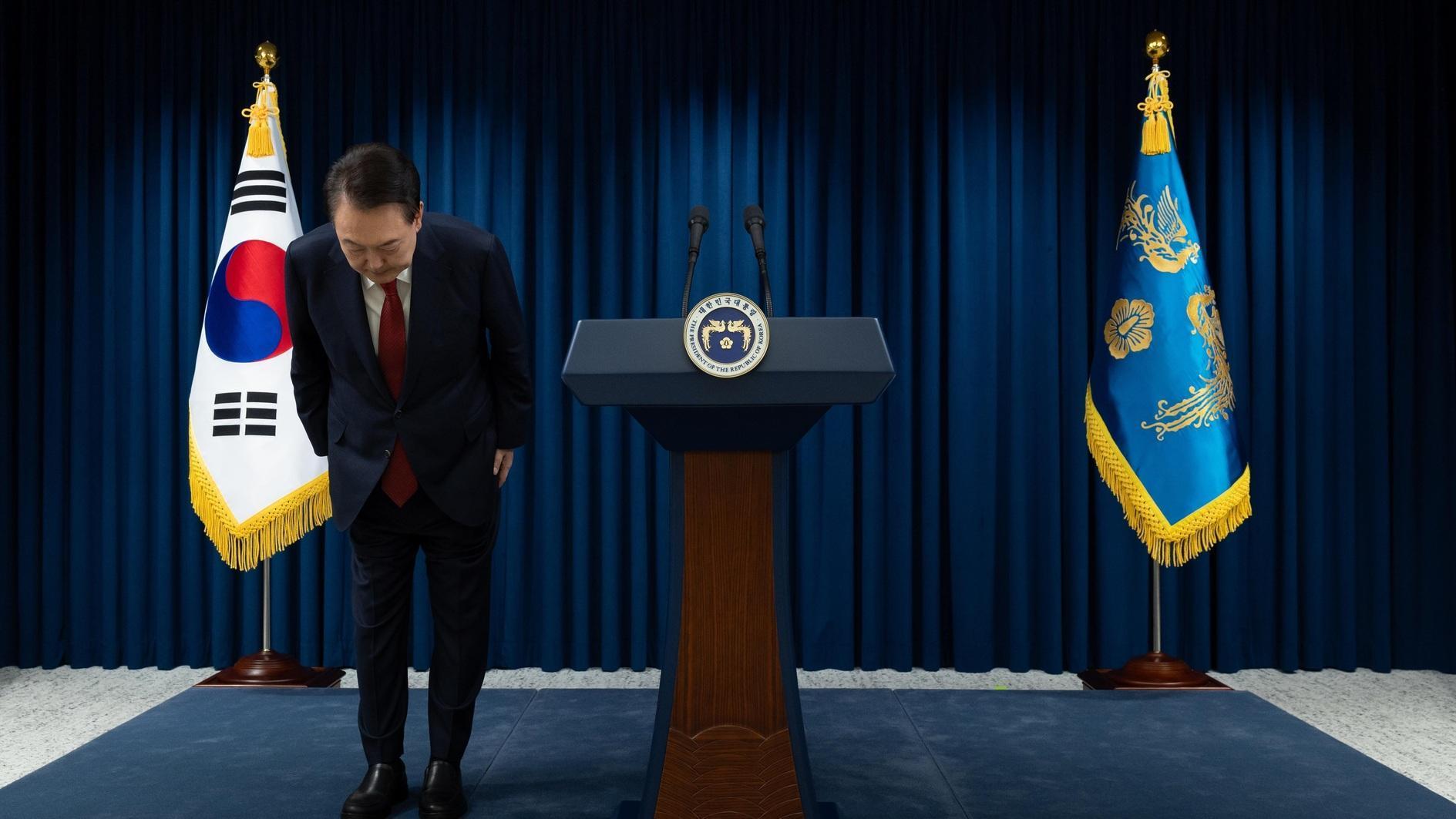
A handout photo made available by the South Korean Presidential Office shows President Yoon Suk Yeol bowing during his address to the nation at the Presidential office in Seoul, South Korea, Dec.7, 2024.
South Korea's embattled President Yoon Suk Yeol apologised but stopped short of resigning Saturday over his declaration of martial law, as protesters gathered outside parliament ahead of a crucial impeachment vote that could decide his political fate.
Yoon stunned the nation and the international community Tuesday night by imposing martial law for the first time in over four decades and deploying troops and helicopters to parliament.
But lawmakers managed to vote down the decree, forcing Yoon to rescind the order in the early hours of Wednesday in a night of extraordinary drama for a country assumed to be a stable democracy.
"The declaration of martial law arose from my desperation as president," he said in a televised address, the first time he has appeared before the public since plunging the country into political chaos.
"I caused anxiety and inconvenience to the public. I sincerely apologise," he said.
The opposition and key members of his own party have called for him to step down, and parliament is set to vote later Saturday on his impeachment, although opposition leader Lee Jae-myung told AFP it was not clear the motion would pass.
Hundreds of protesters began to gather outside the parliament building by lunchtime Saturday ahead of the vote, with organisers hoping 200,000 people would attend to pile pressure on lawmakers.
Yoon did not offer to resign in his brief address, saying only that he would "entrust the party with measures to stabilise the political situation, including my term in office."
His People Power Party (PPP) is divided on the issue, with lawmakers late Friday sticking to the official line that they would block impeachment, even after party head Han Dong-hoon said Yoon must go or Seoul risked more political chaos.
"The normal performance of the president's duties is impossible under the (current) circumstances, and an early resignation of the president is inevitable," Han Dong-hoon told reporters Saturday.
Enough votes?
The opposition bloc holds 192 seats in the 300-strong parliament, while Yoon's PPP has 108.
Just eight ruling party lawmakers need to defect for the vote to get the two-thirds majority it needs to pass, after which Yoon would be suspended from duties pending a ruling by the Constitutional Court.
Police have also begun investigating Yoon and others for alleged insurrection.
"I will not shy away from the issue of legal and political responsibility regarding the declaration of martial law," Yoon said during his address.
Opposition leader Lee said Yoon's speech was "very disappointing" given widespread public demands for him to step down.
His speech "only exacerbates the sense of betrayal and anger among the citizens", he said, adding the only solution to the current political chaos was "the immediate resignation of the president or an early departure through impeachment".
An opinion poll released Friday put backing for the 63-year-old president at a record low of 13 percent.
"The public will not forgive him," 63-year-old retiree Lee Wan-pyo told AFP at Seoul's main train station, where he was watching the president's speech live on television.
"I just want him to step down," said Han jeong-hwa, a 70-year-old housewife, who was also watching at Seoul station.
The martial law debacle was "unfortunate", said 19-year-old Jeon Yeon-ho, who said he'd taken South Korea's crucial university exam last month.
South Korea needs "to prevent such events from being recorded in history again," Jeon added.
Some protestors had camped out all in Seoul's Yeouido district, where the National Assembly is located, despite freezing temperatures, while opposition MPs remained in parliament overnight, fearing Yoon might try some desperate measure to remain in office.
In his address declaring martial law late Tuesday, Yoon claimed it would "eliminate anti-state elements plundering people's freedom and happiness".
Security forces sealed the National Assembly, helicopters landed on the roof, and almost 300 soldiers tried to lock down the building.
But as parliamentary staffers blocked the soldiers with sofas and fire extinguishers, enough MPs got inside — many climbed walls to enter — and voted down Yoon's move.
Soldiers had been ordered to detain key politicians, lawmakers from both parties have said, with the special forces chief later describing being given orders to "drag out" MPs from parliament.
Experts and lawmakers have speculated that the elite special forces soldiers may have slow-walked following orders, after discovering themselves to be involved in a political rather than national security incident.
The episode brought back painful memories of South Korea's autocratic past and blindsided its allies, with the U.S. administration only finding out via television.
U.S. Secretary of State Antony Blinken told his Korean counterpart Cho Tae-yul on Friday that he "expects the... democratic process to prevail".